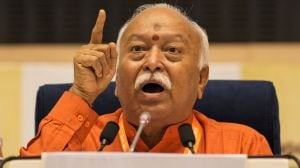Stay updated with the latest - Click here to follow us on Instagram
Speeches called for non-violence: Jailed JNU student Sharjeel Imam to Delhi HC
A division bench of Justice Siddharth Mridul and Justice Talwant Singh was hearing Imam's bail appeal for allegedly making inflammatory speeches against the CAA.
 In his plea before the High Court, Imam has said the trial court “failed to recognise” that the charge of sedition no longer existed and therefore relief must be granted to him. (file)
In his plea before the High Court, Imam has said the trial court “failed to recognise” that the charge of sedition no longer existed and therefore relief must be granted to him. (file) The Delhi High Court Monday asked the Delhi Police to seek instructions on whether Sharjeel Imam’s bail plea should be remanded back to the trial court or not, after it noted that the trial court’s order rejecting the JNU student’s bail did not contain any grounds for rejection of the same.
A division bench of Justice Siddharth Mridul and Justice Talwant Singh was hearing Imam’s bail appeal for allegedly making inflammatory speeches against the CAA, involving allegations of sedition under the IPC as well as unlawful activity under the Unlawful Activities Prevention Act (UAPA).
While hearing the parties, the High Court observed that the order passed by the trial court did not record any reasons and the bench cannot sit in appeal on an order where there are no reasons for rejection of bail. It thereafter asked Special Public Prosecutor Amit Prasad, appearing for the Delhi Police, to seek instructions on the issue and listed the matter for hearing on February 15.
The bench while hearing arguments in the matter, further opined that Section 2(1)(o) UAPA, which defines unlawful activity, is completely different from Section 124A IPC which defines sedition. The High Court examined the definitions and said that unlawful activity would be activity which is committed against India, whereas sedition is committed against the “Government established by law in India”.
“This is the principle difference. Sedition is against the government established by law in India/Government of India, it has nothing to do with unlawful activity,” the bench said.
Appearing for Imam, advocate Tanveer Ahmed Mir said Section 124A IPC, 2(1)(o) and Section 13 of the UAPA have to be read together to see whether anything said by his client would tantamount to inciting violence or calling for arms, calling it the “umbilical cord”.
Mir said Imam’s speech actually called for “non-violence” as well as “probity and transparency” to be maintained during the protests against CAA-NRC in 2020. Referring to his speech, Mir said his client said that property should not be burnt down and violence should not be used, which is exactly what he has been charged for.
“I can be opposed to CAA-NRC but I, by no stretch of imagination, want myself or you (persons listening to his speech) to deal with violence,” Mir said, quoting Imam’s speech.
He further said that it was an admitted position that there was no overt act attributed to Imam.
The trial court on January 24, 2022, had framed charges against Imam under IPC sections 124A (sedition), 153A (promoting enmity between different groups on grounds of religion, etc), 153B (imputations, assertions prejudicial to national integration), 505 (statements conducing to public mischief) along with Section 13 (punishment for unlawful activities) of the UAPA. Through the same order, the trial court also rejected Imam’s bail plea, which he has challenged before the HC.
The 2020 FIR, filed at the Crime Branch police station, was in connection with speeches made in Delhi’s Jamia area on December 13, 2019. The Crime Branch accused him of allegedly giving “inflammatory and instigatory speeches against the Government of India on the issue of CAA and NRC”. According to Delhi Police, Imam also made “inflammatorry speech” at the Aligarh Muslim University on December 16, 2019.
The Supreme Court on May 11, 2022, had put on hold trial in all sedition cases pending before courts across the country until the Centre completed its promised exercise “to re-examine and re-consider provisions of Section 124A of the Indian Penal Code” dealing with the offence of sedition.
In his plea before the High Court, Imam has said the trial court “failed to recognise” that pursuant to the directions of the top court, the basis for dismissal of his earlier bail plea, the charge of sedition no longer existed and therefore relief must be granted to him.







